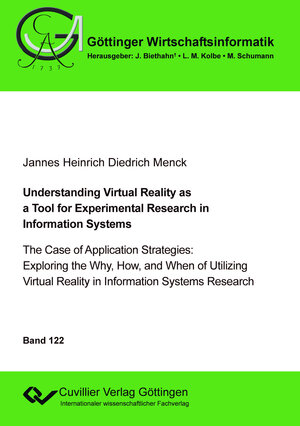Understanding Virtual Reality as a Tool for Experimental Research in Information Systems
The Case of Application Strategies: Exploring the Why, How, and When of Utilizing Virtual Reality in Information Systems Research
von Jannes Heinrich Diedrich MenckThe toolkit of researchers is extended with new technology. The advent of the internet enabled new ways to conduct experiments, facilitating remote data collection and online surveys. A new emerging technology is Virtual Reality (VR), which offers innovative opportunities for creating immersive and interactive research environments. VR can simulate real-world scenarios with high fidelity, allowing researchers to manipulate variables and observe participant behavior in ways that are not possible with traditional methods.
However, the use of VR for experiments is underrepresented in Information Systems (IS) and not well understood. To address the overall research area of VR experiments as a method, four studies were conducted and synthesized in this dissertation. The studies provide novel insights into the design of VR experiments and associated tradeoffs.
The results presented have significant implications for both research and practice related to the design of VR experiments. For researchers, the insights gained from this dissertation can enhance the realism, precision, and generalizability of VR studies while also discussing tradeoffs. For practitioners, the findings can improve the effectiveness of VR-based evaluations, such as user experience design and rapid prototyping. By applying the methodological guidelines and best practices outlined in this dissertation, practitioners can design more effective and engaging VR experiences.
Overall, this dissertation contributes to the broader understanding of VR experiments in IS research, providing a robust foundation for future research and practical applications in this emerging field.
However, the use of VR for experiments is underrepresented in Information Systems (IS) and not well understood. To address the overall research area of VR experiments as a method, four studies were conducted and synthesized in this dissertation. The studies provide novel insights into the design of VR experiments and associated tradeoffs.
The results presented have significant implications for both research and practice related to the design of VR experiments. For researchers, the insights gained from this dissertation can enhance the realism, precision, and generalizability of VR studies while also discussing tradeoffs. For practitioners, the findings can improve the effectiveness of VR-based evaluations, such as user experience design and rapid prototyping. By applying the methodological guidelines and best practices outlined in this dissertation, practitioners can design more effective and engaging VR experiences.
Overall, this dissertation contributes to the broader understanding of VR experiments in IS research, providing a robust foundation for future research and practical applications in this emerging field.







